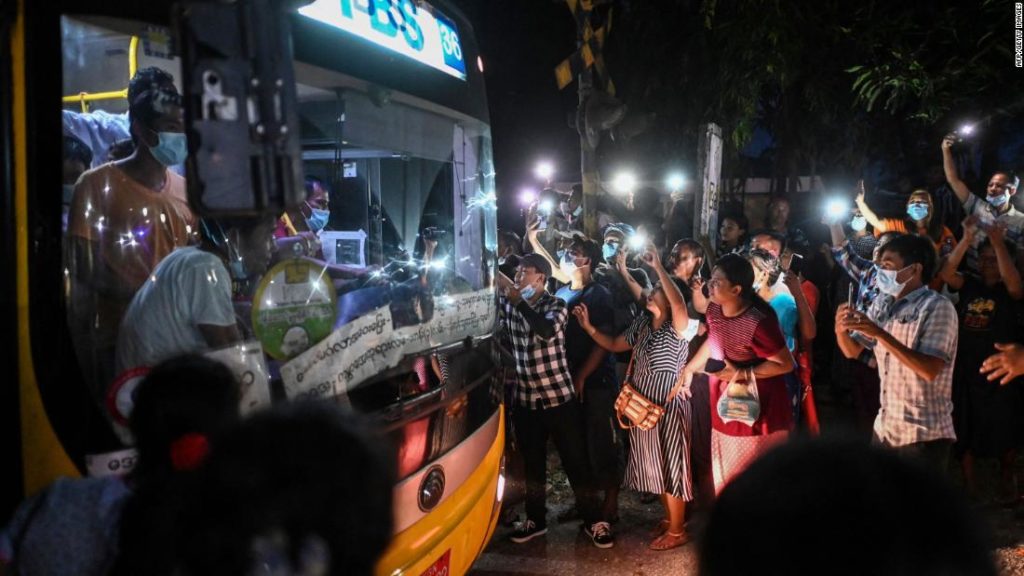Many of the military’s opponents have been held, some convicted, under a law that criminalizes comments that could cause fear or spread false news and is punishable by up to three years in jail. Suu Kyi is on trial for a similar offense, among others, and remains in detention.
Military spokesman Zaw Min Tun said most of those freed had been charged with incitement for joining protests.
“A total of 2,296 people have been released. They took part in protests but not in leading roles. They didn’t participate in violent acts,” he told the Irrawaddy news site.
Reuters could not reach Zaw Min Tun for further comment.
Videos posted on social media showed a stream of mostly young detainees pouring off buses from Yangon’s colonial-era Insein prison, smiling, waving and embracing family members who wept as they arrived.
Others showed a succession of buses leaving the rear entrance of the jail, with passengers leaning from windows and waving at small crowds that gathered outside.
The military has struggled to impose order since it took power, with daily protests nationwide and paralyzing strikes.
Ethnic insurgencies that beset Myanmar for decades have flared anew and civilians angered by a wave of arrests have taken up arms against security forces.
Insein prison chief Zaw Zaw had earlier told Reuters that some 700 people would be released, without giving a reason. He did not respond to subsequent calls seeking comment.
The news portal Myanmar Now said its reporter Kay Zon Nway was freed after 124 days charged with incitement.
“Like many other political detainees, she was unfairly arrested. She has suffered a lot in prison. But today, I’m glad to see her again in great spirits,” Swe Win, Myanmar Now’s editor-in-chief said in a text message.
The Irrawaddy said six journalists were freed altogether.
State-run MRTV made no mention of the release in its nightly newscast.
Western countries have demanded political prisoners be freed and condemned the military takeover. Myanmar’s neighbors in April sought a commitment from its military rulers to initiate dialogue, end the violence and release detainees.
The Assistance Association for Political Prisoners (AAPP), a non-profit based in Thailand, said the mass release was engineered to give the impression the military’s sweeping crackdown had eased.
“Today’s events intend to make it seem like there has been a relaxation in the junta’s oppression. This is not the case,” it said in a statement.
More than 5,200 people are being held, according to AAPP. It also says 883 people have been killed — a figure challenged by the military leadership, which has blamed the unrest on “terrorists” among supporters of Suu Kyi’s party. Reuters has been unable to confirm the numbers.
On Tuesday, the army-run Myawaddy television said authorities had dropped charges against 24 celebrities on wanted lists under the anti-incitement law.
Salai Za Uk Ling of the Chin Human Rights Organization, a group from Chin state, a center of opposition to the takeover by the military, said the release was “quite meaningless” and intended to appease the international community.
He said people were still being arrested daily in Chin state and elsewhere in Myanmar. Reuters was not immediately able to confirm his statement.
“We will face this same problem until they stop the unlawful arrests,” he added. “People will not feel safe in their homes.”
You may also like
-
Afghanistan: Civilian casualties hit record high amid US withdrawal, UN says
-
How Taiwan is trying to defend against a cyber ‘World War III’
-
Pandemic travel news this week: Quarantine escapes and airplane disguises
-
Why would anyone trust Brexit Britain again?
-
Black fungus: A second crisis is killing survivors of India’s worst Covid wave

